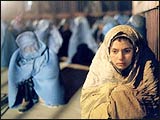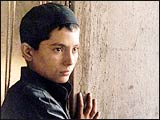 Under any circumstance, Osama would be hailed as a terrific film that celebrates human ingenuity and endurance. But it feels more powerful when one remembers that it was made in Kabul last year where the fanatics are far from vanquished.
Under any circumstance, Osama would be hailed as a terrific film that celebrates human ingenuity and endurance. But it feels more powerful when one remembers that it was made in Kabul last year where the fanatics are far from vanquished.
When producer-director Siddiq Barmak took his film to a number of film festivals last year, he was constantly asked if he had made a documentary about Osama bin Laden.
At Cannes, he told interviewers that he had indeed made a documentary but it was not about bin Laden. His feature film was focused on the reality, Barmak said. In a way, it was also about bin Laden. For it details the horrors women faced under the Taliban regime and one of their godfathers was bin Laden, he explained.
The film made in Dari language won the Golden Globe for the Best Foreign Film. It has just started its American run with showings in New York and Los Angeles. Several shows went full over the weekend, and the movie is acquiring many more theatres in at least a dozen cities next weekend.
| |||||||||||
The movie, which revolves around a 12-year-old girl (the luminous Marina Golbahari), who takes daring risks to help her mother and rest of her impoverished family, has non-professional actors. Marina was, in fact, a beggar on Kabul streets when Barmak, a documentary filmmaker whose work was destroyed by the Taliban, spotted her.
Barmak recalled in an interview recently that he asked Marina during their first meeting if she wanted to act in a film. She had never seen a film, he would learn soon. In fact, she did not even know what a film was. Many of his artistes in the film were found in refugee camps. "I found this little boy who made the smoke standing on the street when he was walking to capture dogs and sell them. It was very interesting, and I asked him, given an offer to play a role in my film," he recalled.
"I'm ready to play the role in your film but with one condition. You have to buy all my dogs," the boy told him. "It's impossible to buy all dogs," Barmak, who made the film for less than $500,000 from the money raised in European countries, responded. "But I can say okay for one." He used this dog in the film.
Signed on by Barmak after looking at more than 3,000 young girls over a year, Marina plays the daughter of a widow (Zubaida Sahar) who disguises her as a boy so that at least one family member can earn money. The Taliban has forbidden the women going anywhere outside their homes without their husbands or at least a male relative. Since the widow cannot find a male relative to accompany her, she takes the risk of disguising her daughter as a boy.
When Marina starts working, she makes some inevitable mistakes, and the Taliban declare that she is not a good Muslim. Soon, she is sent to an all-male Taliban training school. Some of the film's most harrowing scenes take place in this school. Throughout the film, Barmak reminds us that the all-powerful eyes of Taliban are everywhere. They are not content with ordering women to cover their faces. For they also insist the toes are not bared, so that there is no sexual stimulation of any kind.
Throughout the film, Barmak reminds us that the all-powerful eyes of Taliban are everywhere. They are not content with ordering women to cover their faces. For they also insist the toes are not bared, so that there is no sexual stimulation of any kind.
Barmak is not interested in solely telling the story of one family. He sets film against a broad canvas of humiliation and dangers women suffered under the Taliban. He has also not made an overtly melodramatic and preachy film. Yet the film is immediately accessible to anyone.
The movie is also yet another example of filmmakers across the globe, particularly in countries such as Iran, make startlingly beautiful and truthful films on the human condition. A significant number of these films have found a friendly audience abroad. Osama has turned out to be an art house hit in several countries including Italy. It was also one of the best received films at last year's Toronto International Film Festival.
CREDITS
Direction, story: Siddiq Barmak
Cast: Zubaida Sahar, Marina Golbahari
Running time: 1 hour 22 minutes
Rating: PG-13 for violence, language and some sexuality
Distributor: United Artists






 © 2025
© 2025